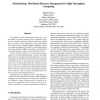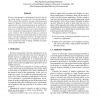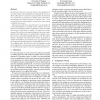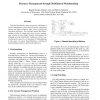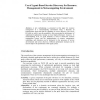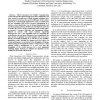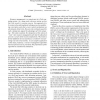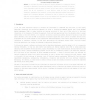HPDC
1998
IEEE
14 years 7 months ago
1998
IEEE
Conventional resource management systems use a system model to describe resources and a centralized scheduler to control their allocation. We argue that this paradigm does not ada...
HOTOS
1999
IEEE
14 years 7 months ago
1999
IEEE
Resource management is a fundamental concept in operating system design. In recent years it has become fashionable to consider the problem as an aspect of heterogeneous support fo...
SIGOPSE
2000
ACM
14 years 7 months ago
2000
ACM
Recently there has been a renewed interest in the application of economic models to the management of computational resources. Most of this interest is focused on pricing models f...
HPDC
2000
IEEE
14 years 7 months ago
2000
IEEE
Federated distributed systems present new challenges to resource management, which cannot be met by conventional systems that employ relatively static resource models and centrali...
HPDC
2000
IEEE
14 years 7 months ago
2000
IEEE
The first decades of the new millennium will witness an explosive growth in the number and diversity of networked devices and portals. We foresee high degrees of mobility, hetero...
EUROPAR
2001
Springer
14 years 7 months ago
2001
Springer
A new methodology is presented in this paper for resource management in a metacomputing environment using a hierarchy of homogeneous agents that has the capability of service disco...
INFOCOM
2002
IEEE
14 years 8 months ago
2002
IEEE
— Third Generation (3G) Mobile Communication systems will provide enhanced high-speed data, multimedia, and voice services to mobile users. Beam forming techniques have been prop...
CCGRID
2002
IEEE
14 years 8 months ago
2002
IEEE
Resource management is a central part of a Grid computing system. In a large-scale wide-area system such as the Grid, security is a prime concern. One approach is to be conservati...
PDP
2003
IEEE
14 years 8 months ago
2003
IEEE
: In this paper the problem of educational resource management in a cooperative learning environment is discussed. A task model was elaborated to determine both functional and leve...
HPDC
2003
IEEE
14 years 8 months ago
2003
IEEE
Dynamic, heterogenous and distributively owned resource environments present unique challenges to the problems of resource representation, allocation and management. Conventional ...
